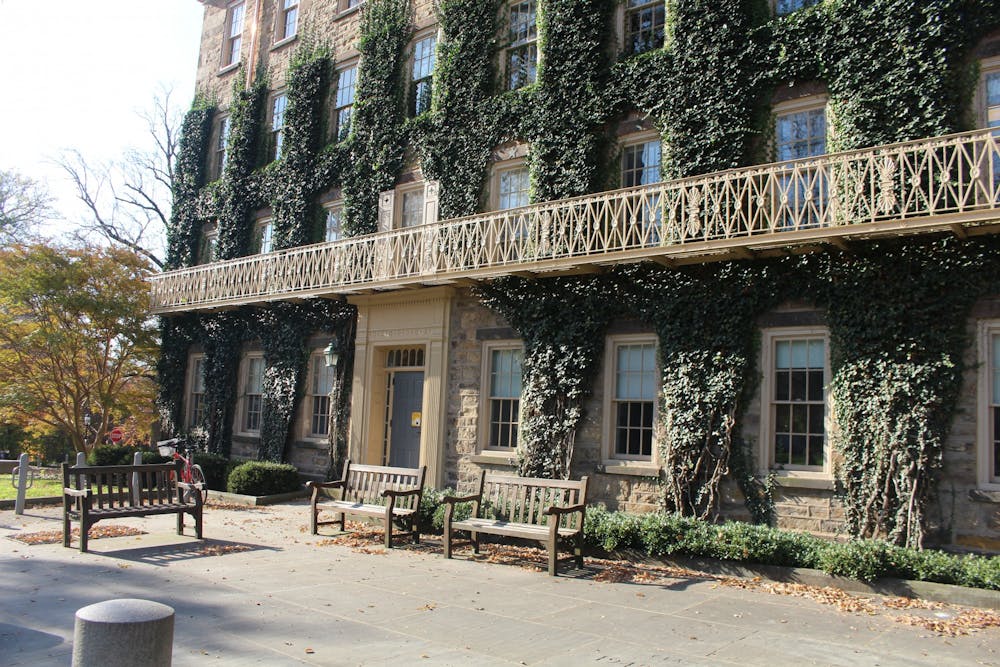The Spring 2023 course catalog features 23 new courses in or cross-listed with the African American Studies Department (AAS), spanning a range of disciplines including theater, poetry, and journalism. This is the most new courses of any department, barring Freshman Seminars, according to the catalog.
In conversations with The Daily Princetonian, faculty offered their perspectives on the importance of interdisciplinary scholarship and discourse in the AAS Department. 21 of the 23 new AAS classes are cross-listed with other departments, with the most common being GSS (eight classes) and Latin American Studies (five classes).
One of these classes cross-listed in the GSS department is AAS 204: Black Performance Theory. Assistant Professor of Theater Rhaisa Williams described it as, “tak[ing] this assumption that Black people are not a monolith and that there’s no one way to be Black … this is a course that will help students be able to contextualize that using performance methods and theories.”
Williams also emphasized the importance of not just focusing on written texts in the content of the class. “We also think about theater, we think about dance, we think about other modes of embodiment, because that’s the way knowledge is produced and transmitted,” she said.
Williams also emphasized the importance of considering Blackness alongside other categories, saying “you can’t think about Blackness without thinking about class, without thinking about gender, without thinking about sexuality.”
AAS 498: Missing Black Women also seeks to incorporate poetry and theater into African American studies; the class will culminate in a “multimedia theatrical production” on the disparity in the treatment of missing Black women and girls by law enforcement and media, according to the course offerings website.
In an email to the ‘Prince,’ Patricia Smith, a prolific poet and visiting professor of creative writing, described poetry as “the way to get us listening again.” Smith is co-teaching the class with poet Mahogany Browne and choreographer Davalois Fearon.
“I want to bring that same unwavering attention [of poetry] to a problem no one really talks about — the problem of missing Black women,” Smith wrote. “I hope [the students] are slapped awake, and that they then begin to do the slapping. I want them to contradict me, to say ‘That couldn't possibly be true,’ to be astounded at what their country is capable of.”

Another class which speaks to the importance of interdisciplinary scholarship is AAS 415: Healing in the Black Atlantic, a class that will use a historical approach to discuss and contextualize modern-day issues. The course — cross-listed in GSS, the Department of History, and the Program in Latin American Studies — will be taught by Elise Mitchell, a postdoctoral fellow in the Department of History.
In addition to smallpox inoculations in West Africa and the HIV/AIDS crisis, Mitchell said the class will be “situating [COVID-19] within a broader historical context.”
“We examine the ways that Black people in particular, but also in community with Native people, in community with Latino people, how have they responded to those health crises over time,” Mitchell told the ‘Prince.’
She continued, “We've been interdisciplinary from the start. Black intellectuals and Black scholars have always worn many hats.”

AAS 200: Methods of Worldbuilding, is taught by Ruha Benjamin, a professor in the Department of African American Studies. The class will “examine the relationship between thought and practice, ways of knowing the world, and ways of remaking it,” according to the course offerings website.
In an interview with the ‘Prince,’ Benjamin described the class’s goal of “learning methods of research,” but also a theme of “how do we use our knowledge and our ideas for social change to create more justice and equity in the world?”
Benjamin pointed to the history of the Black studies movement, which “grew out of student protest for a more expansive curriculum in the ’60s,” she said. “So, it’s a field that grows out of people doing creative work in the world and connecting that to knowledge production.”
AAS 336: Racial Histories of Gender and Sexuality, taught by Marcus Lee, a lecturer in the Council of the Humanities and the AAS department, looks at “histories of and historiographical debates over sex and gender within Black communities,” as described by the course offerings. Lee is also a postdoctoral fellow in LGBTQ+ studies; the course is cross-listed in the Department of Gender and Sexuality Studies (GSS).
“It’s my view that the study of gender and sexuality, the study of race, are sort of essential to any sort of liberal arts education,” Lee said in an interview with the ‘Prince.’
“Part of the impetus for the course is to really get at the histories behind some of the public discourse we see today,” Lee said. “Why the preoccupation with trans communities, generally, or trans people within Black communities? Why the preoccupation with Black queer people as a part of the movement for Black lives?”
Many of the new classes also seek to address gaps regarding the work and presence of Black people in certain fields. Professor Channing Joseph’s course JRN 448/AAS 448: The Media and Social Issues: Writing about Racial Justice in the United States examines the successes and failures of American journalism in reporting on communities of color.
“Typically, there is not as much history as I think there should be. I think that what ends up happening is that students graduate not really understanding how the profession has come to be what it is,” Joseph said, referencing how many early American newspapers grew by running ads for runaway slaves or advertising auctions for enslaved people.
“I think most journalists miss that history and consequently miss why they’re in the situation they’re in today, in terms of having communities that feel alienated by reporting that professional journalists do, having trouble reaching out to new types of audiences,” he said.
Similarly, Professor Rochelle Ellis’s MPP 214/AAS 214: Projects in Vocal Performance: Exploring Art Songs seeks to highlight the work of Black composers in classical music.
“We get a lot of Beethoven and Mozart and Handel, but it’s good to have Florence Price and Margaret Bonds,” she said, referring to two Black female composers in the early 20th century.
Several professors also encouraged students not to be afraid of taking classes in the AAS department.
“There’s a way that taking classes in identity fields like African American studies or Asian American studies or Latino studies can feel like a place that is forbidden if you are not a member of that particular identity category,” said Justin Mann, a visiting research scholar in the AAS department.
Mann will be teaching AAS 326/ENG 286: Topics in African American Culture & Life: Black Speculative Fiction and The Black Radical Imagination in the spring. “I think that we risk losing a lot of conversation and learning potential if people are afraid.”
Miriam Waldvogel is a news contributor for the ‘Prince.’ Please send any correction requests to corrections[at]dailyprincetonian.com.








